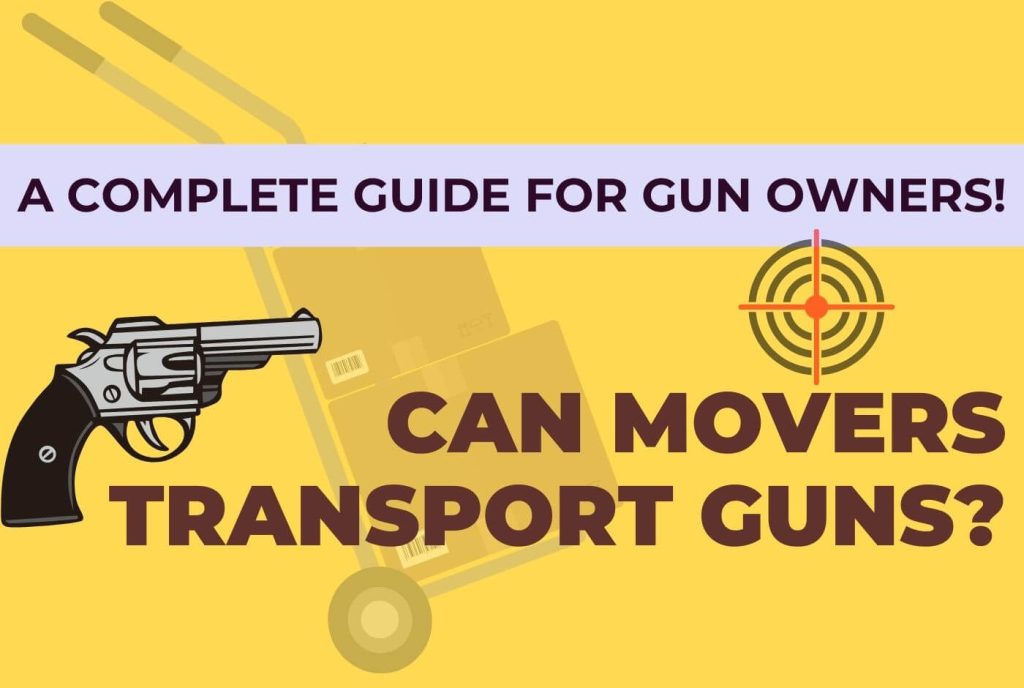Moving as a gun owner? If so, you may ask how movers may securely and legally transport firearms. The University of Chicago found that 46% of American homes have a firearm.
What happens when it’s time to move them to a new home? You don’t want to lose your guns, breach the law, or endanger anyone when moving.

Will movers transport guns? I’ll tell you how to pack your guns, find a good mover, and what to do when you arrive.
What are the Legal Requirements for Gun Transportation by Movers?
State gun transport regulations vary. Like California gun transport laws are different. What’s legal in one state may not be in another. 45 percent of U.S. households owned a gun in 2022. Before hiring movers, check your origin and destination states’ gun transport rules.
Most states demand transporting weapons unloaded and locked. Only the owner can open the container that is moving with guns. Some states require licensed gun dealers to transfer weapons across state lines.
The National Rifle Association (NRA) or your local law enforcement agency can provide state-specific laws. Ask your mover if they know gun transportation restrictions.
How to prepare your guns for the move?
After learning the legalities of gun transportation by movers, prepare your guns for the transfer. Some steps:
- Remove magazines and unload your firearms.
- Clean and test your firearms.
- Store guns in a hard case, gun safe, or lockable cabinet. Padding or bubble wrap helps prevent gun damage.
- Sign and address your container. Write “FIREARMS” on the container to notify movers.
- Store guns and ammo separately. Ammo boxes, metal cans, and plastic bags work. Keep your “AMMUNITION” container away from heat and sparks.
- Inventory your guns and ammunition, including serial numbers, models, and calibers. To prove ownership, photograph your guns and containers.
- Keep your firearms license, registration, and other documentation available for the movers or authorities.
What to look for in a reliable moving company?

Some movers won’t transport firearms. Thus, you must search for a reputable moving company to transport firearms safely.
A trustworthy moving business has these qualities:
Experience
Choose a gun-transporting moving business that knows both states’ rules.
Reputation
Check the moving company’s web reviews or ask gun transport customers for references.
Insurance
Ensure the moving company has enough gun and ammo insurance in case of loss, theft, or damage.
Communication
Ask the moving company how they will communicate and manage difficulties and crises with you.
Price
Compare moving company quotes and expenses to choose a fair and reasonable one.
What to do after you arrive at your new destination?
You must ensure your guns are legal and safe in your new house.
After arriving, do these:
- Check firearms and containers for damage or tampering. Report any issues to the moving company and make a claim.
- Unpack and secure your guns and containers at your new home. Gun safes, locked cabinets, and hidden compartments work.
- Register your guns with local authorities if required. Contact your local law enforcement department or visit their website for gun registration information.
- Change your address and contact information on your gun license and other paperwork. For document updates, contact the issuing agency or visit their website.
Check the gun transportation rules of both states, prepare your guns for the trip, select an excellent moving company, and do certain things after you arrive.
Do Full-Service Movers Transport Guns?
Yes, most full-service movers transport guns. Moving costly guns requires excellent care.
This depends on firearms type, state laws, and mover policy. They cannot transport ammo, gun safes, assault weapons, or machine guns. Since 1972, 37–47% of American households own firearms.
Before packing your guns, check with your mover and understand their terms.
How to prepare your guns for transportation?
You must protect your guns if your mover transports them.
Tips for transporting guns:
- Unload and remove scopes, magazines, and silencers.
- Clean and oil weapons to avoid rust and corrosion.
- Pack weapons in their original cases or strong boxes with padding and labeling. Avoid plastic bags and blankets.
- Keep the keys and tape your boxes. Avoid drawing attention by labeling boxes “guns” or “firearms.”
- Request an inventory sheet from your mover and tell them how many gun boxes you have.
- While moving with guns, carry your firearms license, registration, and receipt.
- Follow state gun transport laws. Permits or advance notice may be required.
Federal Laws and Regulations on Gun Transportation
If you are moving with guns out of state, you may question if movers can carry them. Gun transportation rules vary by state.
To prevent legal issues, follow these general recommendations.
Check State Firearms Laws
Know your origin, destination, and any states you’ll transit through’s firearms restrictions. NRA-ILA and USA Carry provide state gun laws.
Follow FOPA
The FOPA protects legitimate firearm transporters from local and state prohibitions.
If the firearm is empty and inaccessible from the passenger compartment, FOPA allows you to transport it from one legal place to another.
If the vehicle has no compartment, the firearm must be locked in a container other than the glove box or console.
Declare Firearms and Ammo to Movers
Let your movers know you have firearms and ammo, and label their crates. Pack loaded firearms and ammo separately.
Inventory your firearms and ammo, including serial numbers, manufacture, model, and caliber.
Take A Insurance for Firearms and Ammo
Ask your movers about firearms and ammo coverage, restrictions, and exclusions. Check if your homeowners or renters’ insurance covers firearms and ammo in travel.
Listen to Your Movers
Some movers refuse to transport firearms or ammunition, while others charge extra or demand special treatment. Before hiring movers, ask about their policies.
Follow these recommendations to transport weapons and ammunition safely and legally. If you have questions about your case, see a lawyer.
State Laws and Regulations on Gun Transportation
Moving with guns? Before going, check state gun transportation laws. State laws may differ from federal regulations, and you may need a permit, gun registration, or other restrictions.
Common Errors
Gun transport mishaps include
- Not locking the guns.
- Keeping firearms and magazines together.
- Not telling police about guns during a traffic stop or checkpoint.
- Disobeying the state’s concealed carry, open carry, or long gun transit laws.
Penalties
The type and number of guns, the circumstances of the infraction, and the offender’s criminal history determine the penalty for breaching state gun transportation statutes.
Penalties include
- $100–$10,000 fines.
- Misdemeanor or felony charges that could lead to jail or probation.
- Gun permit suspension or revocation.
- Gun confiscation.
How to Avoid Mistakes
Before moving, research state gun transport rules to avoid these blunders and penalties. 2020 saw 434 million civilian weapons.
If you have questions, talk to a gun dealer or lawyer. Transporting guns legally is your responsibility, and ignorance of the law is no excuse.
How Movers Inspect and Handle Firearms?
Learn how movers transport guns before moving them.
Movers take these steps to transfer guns safely and legally.
Check Paperwork
Movers will require firearm ownership and registration. They’ll also check the origin and destination states’ gun laws.
Visual Check
Movers check firearms for damage, wear, and manipulation. They will also check the safety and unloading.
Check Ammunition
Ammunition and explosives will not be moved. They must be appropriately disposed of or transported in your car.
Case Review
Movers check gun cases for cracks, locks, and faults. They’ll also ensure they’re firm and padded to transport your weaponry.
Function Test
Dry-firing with snap caps or dummy rounds will test your guns. They will inspect the trigger, hammer, safety, and magazine release.
Lock Guns
Movers lock, strap, or zip tie weapons in their cases. They will label them “firearms” and store them separately.
Document Info
Movers will record firearms’ make, model, serial number, caliber, and condition. The inspection and handling date, time, and place will be recorded.
Seal Containers
Movers will seal firearm cases with tamper-evident tape or stickers. They will also secure them in the truck or storage facility until delivery.
What to Do If You Want to Transport Guns with Your Movers
You may wonder if your movers can transport guns if you’re moving. Firearm laws vary by state and moving company. 436.4 million weapons as of December 2021 is another projection based on 2020 and 2021 gun sales.
Here are some general guidelines when movers transport guns.
Secure Your Guns
This prevents illegal entry and inadvertent discharge. Gun cases, safes, and secured boxes work. Make sure your movers can lift the container.
Label it “Firearms”
This will notify movers that they are handling fragile things. You can tell your movers about your guns verbally or in writing.
Carry Your Firearms
Instead of the moving truck, move your guns in your car. This improves weapon control and safety. Avoid problems crossing state lines or entering restricted regions with your guns.
Guard Your Firearms
Never leave weapons unsecured in your car or with movers. Always lock and monitor your guns. Don’t leave them unattended in a car, hotel room, or storage facility.
Moving is stressful, but your firearms don’t have to be. You should be fine if you follow state and destination laws, consult with your movers, and pack your guns safely.
Your movers are there to help, not judge or cause issues. Working together will ensure a smooth move. Know if movers can cancel at the last minute.
- How to Prepare Your Lawn Tractor for Moving - March 24, 2024
- How to Prepare for Moving in the Snow: Guide for Prevention - March 24, 2024
- Tips to Get a Precise Moving Quote - March 19, 2024